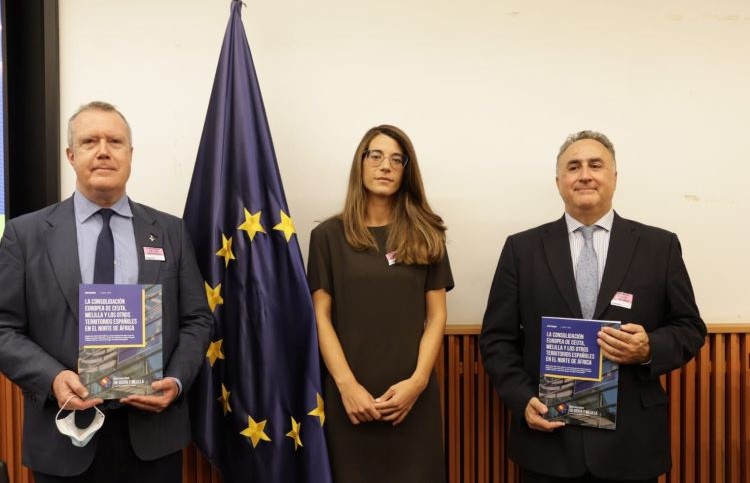The Diplomat
The Observatory of Ceuta and Melilla proposed yesterday the creation of a specific European status for Ceuta and Melilla that allows its declaration as EU External Border Cities in Africa.
The Observatory presented yesterday in the Congress its fifth report, entitled The European consolidation of Ceuta, Melilla and the other Spanish territories in North Africa, which analyzes and proposes actions, measures and strategies to “improve and strengthen the Europeanness and the full membership of Ceuta, Melilla and the rest of Spanish territories in North Africa to the European Union, the Council of Europe and other European bodies”.
Among others, aspects such as the membership and peculiarities of the Schengen system, different Security and Defense issues, the integration in the Customs Union, the modalities of cross-border cooperation, the applicability of international and European environmental programs in the Chafarinas Islands or the greater presence of Ceuta and Melilla in institutions, networks, associations and regional European organizations are analyzed.
Among the short and medium term strategies, the Observatory proposes the establishment of a European outermost region in the two Autonomous Cities and the creation of a specific status in the EU, adapted to the needs of Ceuta and Melilla as EU External Border Cities in Africa, given “the absolutely unique nature of their circumstances in the European and Mediterranean context”. This status “could be established ex novo as an ad hoc solution for these two cities, whose unique character as democratic spaces of equality and multicultural coexistence in North Africa must be preserved as best as possible within the framework of the policies, law and values of the Union”, warns the Observatory.
To argue its proposal, the Observatory recalls that Ceuta and Melilla are “the only EU cities with an external land border in Africa”, suffer a “constant migratory pressure since the 1990s” and are, therefore, “in need of permanent structural measures”, and are even victims of the use of migration “as a political weapon of a non-EU State” (Morocco), which “has used migration to the Cities to achieve objectives in its relationship with our country, such as modifying Spain’s foreign policy”.
Besides, it continues, Ceuta and Melilla are “the only cities in Africa where, thanks to Spain, the EU Treaties, the European Convention on Human Rights and the full guarantee of respect and protection of the values of democracy, fundamental rights and the rule of law are fully applicable”. Therefore, “Spain has a special responsibility in the area of the Strait as the only EU State with jurisdiction, sovereignty and competences to preserve and guarantee in these territories of the African coast the European area of democratic security in force”.
“The creation of an exclusive and specific statute adapted to the needs and particularities of Ceuta and Melilla, as EU External Border Cities in Africa“, would be “more than justified for being the only land border of the EU in Africa and for the migratory pressure that has been constant since the nineties and that is going to continue in the next decades”, declared during the act the co-author and coordinator of the report, Alejandro del Valle Gálvez, professor of International Law of the University of Cadiz and director of the Jean Monnet Center of Excellence.
Marta García Outón, coordinator of the Institute of Security and Culture, and Carlos Echeverría, director of the Observatory of Ceuta and Melilla, also intervened during the presentation. The authors of this report are a group of professors and researchers from the Area of International Public Law and International Relations of the University of Cadiz, linked to the Jean Monnet Center of Excellence. The Ceuta and Melilla Observatory was created within the Institute for Security and Culture, a think tank specialized in Security and Defense that develops research and dissemination activities.







